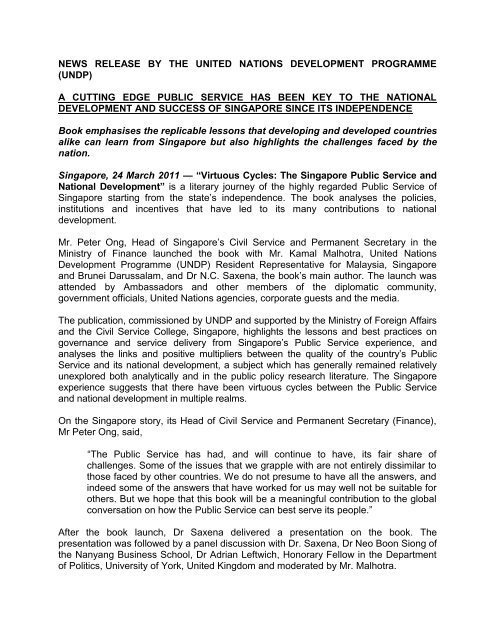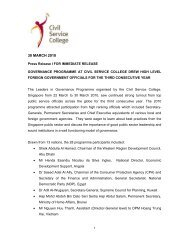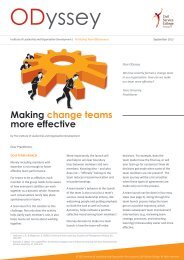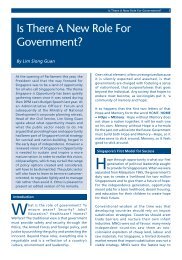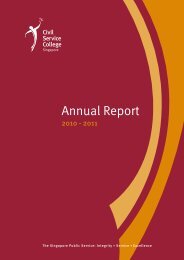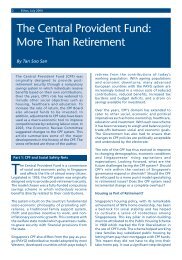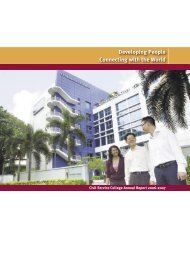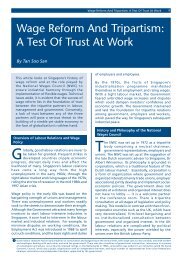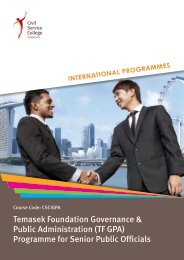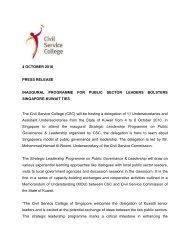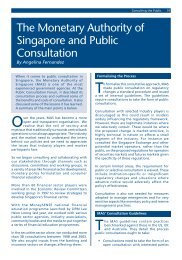The Singapore Public Service and National Development
The Singapore Public Service and National Development
The Singapore Public Service and National Development
Create successful ePaper yourself
Turn your PDF publications into a flip-book with our unique Google optimized e-Paper software.
NEWS RELEASE BY THE UNITED NATIONS DEVELOPMENT PROGRAMME<br />
(UNDP)<br />
A CUTTING EDGE PUBLIC SERVICE HAS BEEN KEY TO THE NATIONAL<br />
DEVELOPMENT AND SUCCESS OF SINGAPORE SINCE ITS INDEPENDENCE<br />
Book emphasises the replicable lessons that developing <strong>and</strong> developed countries<br />
alike can learn from <strong>Singapore</strong> but also highlights the challenges faced by the<br />
nation.<br />
<strong>Singapore</strong>, 24 March 2011 — “Virtuous Cycles: <strong>The</strong> <strong>Singapore</strong> <strong>Public</strong> <strong>Service</strong> <strong>and</strong><br />
<strong>National</strong> <strong>Development</strong>” is a literary journey of the highly regarded <strong>Public</strong> <strong>Service</strong> of<br />
<strong>Singapore</strong> starting from the state’s independence. <strong>The</strong> book analyses the policies,<br />
institutions <strong>and</strong> incentives that have led to its many contributions to national<br />
development.<br />
Mr. Peter Ong, Head of <strong>Singapore</strong>’s Civil <strong>Service</strong> <strong>and</strong> Permanent Secretary in the<br />
Ministry of Finance launched the book with Mr. Kamal Malhotra, United Nations<br />
<strong>Development</strong> Programme (UNDP) Resident Representative for Malaysia, <strong>Singapore</strong><br />
<strong>and</strong> Brunei Darussalam, <strong>and</strong> Dr N.C. Saxena, the book’s main author. <strong>The</strong> launch was<br />
attended by Ambassadors <strong>and</strong> other members of the diplomatic community,<br />
government officials, United Nations agencies, corporate guests <strong>and</strong> the media.<br />
<strong>The</strong> publication, commissioned by UNDP <strong>and</strong> supported by the Ministry of Foreign Affairs<br />
<strong>and</strong> the Civil <strong>Service</strong> College, <strong>Singapore</strong>, highlights the lessons <strong>and</strong> best practices on<br />
governance <strong>and</strong> service delivery from <strong>Singapore</strong>’s <strong>Public</strong> <strong>Service</strong> experience, <strong>and</strong><br />
analyses the links <strong>and</strong> positive multipliers between the quality of the country’s <strong>Public</strong><br />
<strong>Service</strong> <strong>and</strong> its national development, a subject which has generally remained relatively<br />
unexplored both analytically <strong>and</strong> in the public policy research literature. <strong>The</strong> <strong>Singapore</strong><br />
experience suggests that there have been virtuous cycles between the <strong>Public</strong> <strong>Service</strong><br />
<strong>and</strong> national development in multiple realms.<br />
On the <strong>Singapore</strong> story, its Head of Civil <strong>Service</strong> <strong>and</strong> Permanent Secretary (Finance),<br />
Mr Peter Ong, said,<br />
“<strong>The</strong> <strong>Public</strong> <strong>Service</strong> has had, <strong>and</strong> will continue to have, its fair share of<br />
challenges. Some of the issues that we grapple with are not entirely dissimilar to<br />
those faced by other countries. We do not presume to have all the answers, <strong>and</strong><br />
indeed some of the answers that have worked for us may well not be suitable for<br />
others. But we hope that this book will be a meaningful contribution to the global<br />
conversation on how the <strong>Public</strong> <strong>Service</strong> can best serve its people.”<br />
After the book launch, Dr Saxena delivered a presentation on the book. <strong>The</strong><br />
presentation was followed by a panel discussion with Dr. Saxena, Dr Neo Boon Siong of<br />
the Nanyang Business School, Dr Adrian Leftwich, Honorary Fellow in the Department<br />
of Politics, University of York, United Kingdom <strong>and</strong> moderated by Mr. Malhotra.
News Release – “Virtuous Cycles: <strong>The</strong> <strong>Singapore</strong> <strong>Public</strong> <strong>Service</strong> <strong>and</strong> <strong>National</strong> <strong>Development</strong>”<br />
Page-2<br />
Mr. Kamal Malhotra, UNDP Resident Representative for Malaysia, <strong>Singapore</strong> <strong>and</strong><br />
Brunei said,<br />
“This book both addresses the issues which make <strong>Singapore</strong>’s <strong>Public</strong> <strong>Service</strong><br />
effective <strong>and</strong> seeks to explain why. What were <strong>and</strong> are the policy choices that<br />
<strong>Singapore</strong> made <strong>and</strong> continues to make, the institutional arrangements <strong>and</strong><br />
incentives it has put in place, <strong>and</strong> the investment decisions that have allowed<br />
<strong>Singapore</strong> to become an isl<strong>and</strong> of excellence in the area of the management <strong>and</strong><br />
delivery of public services? How has it created an enabling environment that<br />
empowers <strong>Public</strong> <strong>Service</strong> institutions to cope with <strong>and</strong> manage change? How<br />
has the capacity of the civil service been developed <strong>and</strong> enhanced to keep it at<br />
the cutting edge?<br />
Finally, <strong>and</strong> perhaps most importantly from the perspective of UNDP, what are<br />
the replicable lessons that developing <strong>and</strong> developed countries alike can learn<br />
from <strong>Singapore</strong>? This book also seeks to analyse how <strong>Singapore</strong>’s government<br />
institutions have coped with change in the context of fast accelerating<br />
globalisation. This should enable an underst<strong>and</strong>ing of how <strong>Singapore</strong>’s policies,<br />
institutions <strong>and</strong> incentives can be adapted to different country contexts. <strong>The</strong> book<br />
also elaborates on some of the challenges facing the <strong>Singapore</strong> <strong>Public</strong> <strong>Service</strong><br />
going forward.”<br />
<strong>The</strong> book consists of six chapters that cover key issues such as a history of the state’s<br />
formative years, key national policies, building institutions for clean <strong>and</strong> effective<br />
governance, public sector capacity development <strong>and</strong> reforms, challenges facing the<br />
<strong>Public</strong> <strong>Service</strong> <strong>and</strong> key lessons that other countries can learn from <strong>Singapore</strong>. It ends<br />
with a chapter on the <strong>Singapore</strong> Cooperation Programme, which explains how<br />
<strong>Singapore</strong> actively shares its knowledge <strong>and</strong> experiences with friends from the<br />
developing countries.<br />
On the need for the <strong>Singapore</strong> <strong>Public</strong> <strong>Service</strong> to constantly reinvent itself, Mr Ong said,<br />
“<strong>The</strong> problems that face <strong>Singapore</strong> today are complex <strong>and</strong> we remain vulnerable<br />
to changes brought about by global events.<br />
Our officers need to collaborate across agencies as well as consider new <strong>and</strong><br />
innovative ways of tackling problems. This requires an integrated <strong>and</strong> adaptable<br />
<strong>Public</strong> <strong>Service</strong>. We need officers willing to take some risks in policy design <strong>and</strong><br />
implementation.<br />
As <strong>Singapore</strong> develops <strong>and</strong> <strong>Singapore</strong>ans become more global in orientation, the<br />
dem<strong>and</strong>s on the public sector will change. <strong>The</strong> public sector needs to embrace<br />
the ideas <strong>and</strong> energy that lie beyond the <strong>Public</strong> <strong>Service</strong>. By tapping on the<br />
collective wisdom <strong>and</strong> creativity of individuals, NGOs <strong>and</strong> companies, we can
News Release – “Virtuous Cycles: <strong>The</strong> <strong>Singapore</strong> <strong>Public</strong> <strong>Service</strong> <strong>and</strong> <strong>National</strong> <strong>Development</strong>”<br />
Page-3<br />
better tackle the challenges <strong>and</strong> seize the opportunities in a more complex <strong>and</strong><br />
volatile external environment.”<br />
Although <strong>Singapore</strong> has ongoing programmes to correct strategic, policy-level <strong>and</strong><br />
organisational deficiencies, the book highlights that policy makers have also identified<br />
other important challenges that the <strong>Public</strong> <strong>Service</strong> has been facing in recent years,<br />
among them, employing, training <strong>and</strong> retaining <strong>Public</strong> <strong>Service</strong> leaders <strong>and</strong> officers with<br />
the right skill sets <strong>and</strong> aptitude; engaging <strong>and</strong> catering to the changing needs <strong>and</strong> rising<br />
aspirations of the population; meritocracy <strong>and</strong> income inequality, <strong>and</strong> dealing with<br />
increasingly uncertain, complex <strong>and</strong> cross-cutting policy issues.<br />
<strong>The</strong> success of the <strong>Public</strong> <strong>Service</strong> can be attributed to reforms to capitalise on<br />
institutionalised outcomes such as assigning operational authority to delegated Boards<br />
<strong>and</strong> autonomous agencies, while retaining the power of regulatory oversight <strong>and</strong> policy<br />
direction within central agencies; budgetary reforms to maximise the public sector value<br />
proposition; instilling a culture of ownership, pride <strong>and</strong> continuous improvement in the<br />
<strong>Public</strong> <strong>Service</strong>, through on-going training as well as reform movements such as PS21;<br />
measuring <strong>and</strong> rewarding organisational performance, with incentives <strong>and</strong> awards for<br />
innovative practices; continuous innovation, such as the use of information technology,<br />
to engender greater efficiency, citizen satisfaction, timely information flows <strong>and</strong><br />
transparency <strong>and</strong> a culture of leadership by example, which transmits strong values <strong>and</strong><br />
principles of good governance socially rather than formally throughout the public sector.<br />
Mr. Malhotra concluded,<br />
“As UNDP, we are particularly pleased with this opportunity to examine this<br />
specific inspiring example of development achievement because of the early<br />
significant role played by UNDP <strong>and</strong> other UN agencies in <strong>Singapore</strong>’s history.<br />
As you will learn when you read the book, one of the first acts of the new<br />
government when <strong>Singapore</strong> attained self-rule in 1959 was to request advice<br />
from the United Nations Exp<strong>and</strong>ed Programme of Technical Assistance (UN-<br />
EPTA), which would later become UNDP, to develop a blueprint for an<br />
industrialization programme for <strong>Singapore</strong>. Dr Albert Winsemius, a Dutch<br />
economist, led the first UN assessment mission to <strong>Singapore</strong> in 1960 which<br />
presented a ten-year development plan to transform <strong>Singapore</strong> into a centre of<br />
manufacturing <strong>and</strong> industrialization to the government, most of which was<br />
implemented with considerable success.<br />
In the following decades, UNDP together with other UN agencies such as the<br />
FAO, ILO, ITU, UNESCO, UNIDO, UNCTAD, WHO as well as the World Bank,<br />
would provide technical expertise in areas ranging from urban planning,<br />
agriculture <strong>and</strong> fisheries, manufacturing, transportation <strong>and</strong> communication, to<br />
education, health <strong>and</strong> government reform. This was indeed a good example of<br />
effective development cooperation, which should st<strong>and</strong> as an example to the<br />
international development community.”<br />
* * *
News Release – “Virtuous Cycles: <strong>The</strong> <strong>Singapore</strong> <strong>Public</strong> <strong>Service</strong> <strong>and</strong> <strong>National</strong> <strong>Development</strong>”<br />
Page-4<br />
ABOUT UNITED NATIONS DEVELOPMENT PROGRAMME (UNDP)<br />
UNDP is the UN’s global development network,<br />
advocating for change <strong>and</strong> connecting countries to<br />
knowledge, experience <strong>and</strong> resources to help people<br />
build a better life. We are on the ground in 166<br />
countries, working collaboratively on their own<br />
solutions to national <strong>and</strong> global development<br />
challenges. Please visit: www.undp.org<br />
Supported by:<br />
ABOUT CIVIL SERVICE COLLEGE, SINGAPORE<br />
<strong>The</strong> Civil <strong>Service</strong> College (CSC) is the central learning<br />
institution for the <strong>Singapore</strong> <strong>Public</strong> <strong>Service</strong>. With a<br />
focus on governance, policymaking, public<br />
administration, leadership <strong>and</strong> management, CSC<br />
establishes partnerships with individuals <strong>and</strong><br />
organisations to exchange knowledge, expertise <strong>and</strong><br />
experience in the business of government. Please<br />
visit: www.cscollege.gov.sg<br />
ABOUT MINISTRY OF FOREIGN AFFAIRS, SINGAPORE<br />
<strong>The</strong> Ministry of Foreign Affairs (MFA) was established<br />
in 1965 to exp<strong>and</strong> <strong>Singapore</strong>'s international space <strong>and</strong><br />
safeguard <strong>Singapore</strong>'s sovereignty. Through the<br />
<strong>Singapore</strong> Cooperation Programme, administered by<br />
MFA, <strong>Singapore</strong> shares its development experience<br />
with friends from about 170 countries. Please visit:<br />
www.mfa.gov.sg
News Release – “Virtuous Cycles: <strong>The</strong> <strong>Singapore</strong> <strong>Public</strong> <strong>Service</strong> <strong>and</strong> <strong>National</strong> <strong>Development</strong>”<br />
Page-5<br />
For queries, please contact:<br />
Mr Ahmad Hafiz Osman, Communications Officer, UNDP Malaysia, <strong>Singapore</strong> <strong>and</strong><br />
Brunei Darussalam<br />
E: ahmad.hafiz@undp.org<br />
DL: 603-2091 5154<br />
M: 012 302 1234<br />
F: 603-2095 2870<br />
W: www.undp.org.my<br />
Mr Gerard Ortega, Assistant Manager, Communications <strong>and</strong> Customer <strong>Service</strong>,<br />
Civil <strong>Service</strong> College<br />
E: Gerard_ORTEGA@cscollege.gov.sg<br />
T: 6874 1889<br />
M: 9747 2870<br />
F: 6874 1735
Overview<br />
“VIRTUOUS CYCLES: THE SINGAPORE PUBLIC SERVICE AND<br />
NATIONAL DEVELOPMENT”<br />
FACT SHEET<br />
“Virtuous Cycles: <strong>The</strong> <strong>Singapore</strong> <strong>Public</strong> <strong>Service</strong> <strong>and</strong> <strong>National</strong> <strong>Development</strong>”<br />
addresses what makes the <strong>Singapore</strong> public sector effective <strong>and</strong> why. <strong>The</strong> book<br />
examines the fundamental challenges governments must confront, how public sector<br />
institutions may go about approaching these challenges, <strong>and</strong> how they may be<br />
successfully applied in a range of different contexts.<br />
United Nations <strong>Development</strong> Programme’s (UNDP) Collaboration with<br />
<strong>Singapore</strong>’s Ministry of Foreign Affairs (MFA) <strong>and</strong> Civil <strong>Service</strong> College (CSC)<br />
<strong>The</strong> concept of the book originated from UNDP after it commissioned a study on<br />
<strong>Singapore</strong>'s <strong>Public</strong> Sector Governance in 2009, with the view that a book could yield<br />
insights of value to other public administrations around the world.<br />
Dr N.C. Saxena, a veteran public servant from India, was engaged to carry out the<br />
research <strong>and</strong> to author the book Virtuous Cycles.<br />
Sharing UNDP’s belief that such a book could contribute to the global conversation<br />
on governance, <strong>Singapore</strong> supported UNDP’s efforts through MFA <strong>and</strong> CSC. MFA<br />
provided funding for the publication <strong>and</strong> CSC assisted by hosting Dr Saxena’s study<br />
visits <strong>and</strong> by facilitating meetings with relevant agencies for his research.<br />
Mr Peter Ong, <strong>Singapore</strong>’s Head of Civil <strong>Service</strong>, contributed the foreword of the<br />
book while Mr Kamal Malhotra, the UNDP Resident Representative for Malaysia,<br />
<strong>Singapore</strong> <strong>and</strong> Brunei Darussalam, contributed the book preface.
OPENING ADDRESS BY MR PETER ONG,<br />
HEAD, CIVIL SERVICE AND<br />
PERMANENT SECRETARY, MINISTRY OF FINANCE<br />
AT THE LAUNCH EVENT OF THE UNDP BOOK<br />
VIRTUOUS CYCLES: THE SINGAPORE PUBLIC SERVICE AND NATIONAL<br />
DEVELOPMENT<br />
THURSDAY, 24 MARCH 2011<br />
AT THE CIVIL SERVICE COLLEGE AUDITORIUM<br />
Mr Kamal Malhotra, United Nations <strong>Development</strong> Programme (UNDP) Resident<br />
Representative for Malaysia, <strong>Singapore</strong> <strong>and</strong> Brunei<br />
Dr Naresh Saxena,<br />
Distinguished Guests,<br />
Ladies <strong>and</strong> Gentlemen<br />
1. Good morning. First <strong>and</strong> foremost, let me extend a warm welcome to Mr<br />
Kamal Malhotra, <strong>and</strong> Dr Saxena, the author of the book that the UNDP is launching<br />
today.<br />
UNDP <strong>and</strong> <strong>Singapore</strong><br />
2. <strong>The</strong> UNDP <strong>and</strong> <strong>Singapore</strong> have a warm relationship which dates back more<br />
than five decades. In 1960, the Dutch economist Dr Albert Winsemius led a UN<br />
Industrial Survey Mission to <strong>Singapore</strong> to assess our potential for industrialisation.<br />
He was also asked to provide inputs for <strong>Singapore</strong>’s economic masterplan. Dr<br />
Winsemius was subsequently appointed as an economic adviser to <strong>Singapore</strong>, a<br />
role he kept for more than two decades till 1984. Minister Mentor Lee Kuan Yew, in<br />
his memoirs, credited the UNDP <strong>and</strong> its precursor organisation for seeding the idea<br />
of <strong>Singapore</strong> leapfrogging our region <strong>and</strong> becoming a hub for manufacturing <strong>and</strong><br />
industrialisation. As a result, we embarked on an export-oriented industrialisation<br />
1
path <strong>and</strong> developed an environment attractive to foreign investment, establishing<br />
many new industries that created jobs for our growing population.<br />
3. Having benefited from the generous provision of foreign technical assistance<br />
over the years, we have been privileged to share our developmental experience with<br />
countries around the world since the 1960s. For example, we provide technical<br />
assistance through the <strong>Singapore</strong> Cooperation Programme (SCP) administered by<br />
the Ministry of Foreign Affairs. We have shared with more than 70,000 officials from<br />
170 countries <strong>Singapore</strong>'s approach to public administration, economic<br />
development, <strong>and</strong> urban planning, among other areas.<br />
4. <strong>Singapore</strong> <strong>and</strong> the UNDP have also co-operated closely in the area of<br />
promoting good governance. Several training programmes, developed jointly by the<br />
UNDP <strong>and</strong> our Ministry of Foreign Affairs <strong>and</strong> involving many other <strong>Singapore</strong><br />
agencies, have been institutionalised on this <strong>and</strong> related topics. Under the<br />
<strong>Singapore</strong>-UNDP Technical Cooperation for Developing Countries (TCDC)<br />
framework that was established in 1992, about 1,200 government officials from 86<br />
developing countries have participated in 89 joint training programmes covering<br />
diverse fields, ranging from civil aviation management to foreign investment<br />
promotion.<br />
Good Governance<br />
5. <strong>The</strong> UNDP has an interest in promoting good governance in both developing<br />
<strong>and</strong> developed countries. Indeed, good governance is critical to the success of any<br />
country, <strong>and</strong> requires capable <strong>and</strong> committed men <strong>and</strong> women at all rungs of<br />
government.<br />
6. One key message in the book that we are launching today, Virtuous Cycles:<br />
<strong>The</strong> <strong>Singapore</strong> <strong>Public</strong> <strong>Service</strong> <strong>and</strong> <strong>National</strong> <strong>Development</strong>, is that good governance<br />
2
was an important ingredient in <strong>Singapore</strong>’s development experience <strong>and</strong> in our<br />
success thus far.<br />
7. As our first priority, we had to eradicate that which is antithetical to good<br />
governance, specifically corruption. <strong>Singapore</strong> did this with strong political will,<br />
credible legislation <strong>and</strong> effective enforcement. At the same time, we built up<br />
institutional <strong>and</strong> human resource capacity building to ensure that our model of<br />
governance is forward-looking. PS21, or our <strong>Public</strong> <strong>Service</strong> in the 21 st century<br />
initiative, sought to build up a public service that was proactive rather than reactive.<br />
It tapped on the creativity of public servants <strong>and</strong> exhorted them to be responsive<br />
<strong>and</strong> to serve with excellence. We also invested heavily in building our anticipatory<br />
capacity, from our early efforts in scenario planning to the more recent setting up of<br />
the Centre for Strategic Futures: all these are aimed at developing public service<br />
capabilities in preparing for the future, in order to better address emerging strategic<br />
challenges <strong>and</strong> opportunities.<br />
8. While all these served us well, we cannot be complacent. Good governance<br />
requires that we constantly seek out ways to improve ourselves, upgrade our<br />
capabilities <strong>and</strong> better serve the needs of the people.<br />
9. <strong>The</strong> public sector could achieve greater outcomes by focusing on improving<br />
the quality of its relationship with the public. This goes beyond delivering public<br />
services in a timely <strong>and</strong> efficient manner. We can do more by investing in greater<br />
consultation <strong>and</strong> engagement with the public, as well as by involving the public more<br />
in public policy making <strong>and</strong> implementation. This will engender a greater sense of<br />
ownership by the public over issues that are close to their hearts. This consultative<br />
<strong>and</strong> collaborative approach will be more time consuming <strong>and</strong> requires greater effort<br />
to forge consensus. This is the trade-off that we must balance.<br />
10. As <strong>Singapore</strong>ans become more affluent <strong>and</strong> global in orientation, the<br />
dem<strong>and</strong>s on the public sector will change. <strong>The</strong> public sector needs to embrace the<br />
3
ideas <strong>and</strong> energy that lie beyond the public service. By tapping on the collective<br />
wisdom <strong>and</strong> creativity of individuals, NGOs <strong>and</strong> companies, we can better tackle the<br />
challenges <strong>and</strong> seize the opportunities in a more complex <strong>and</strong> volatile environment.<br />
11. A good example is NParks’ Communities in Bloom social initiative that<br />
encourages communities to come together to beautify their surroundings. NParks<br />
provides advice <strong>and</strong> some basic gardening materials to help residents start their<br />
community gardens. <strong>The</strong>reafter, the residents organise themselves to keep their<br />
gardens going, developing a community spirit that binds residents together. In taking<br />
on the role of facilitator <strong>and</strong> encouraging the public to work with each other, the<br />
public sector helps to build social capital <strong>and</strong> makes <strong>Singapore</strong> more socially<br />
resilient.<br />
Virtuous Cycles<br />
12. When the UNDP commissioned Dr Saxena to write a book on <strong>Singapore</strong>’s<br />
<strong>Public</strong> Sector Governance in 2009, with the idea that it could yield insights of value<br />
to other public administrations around the world, we were honoured to be able to<br />
share the <strong>Singapore</strong> experience. Dr Saxena has done a good job highlighting the<br />
development <strong>and</strong> best practices of the <strong>Singapore</strong> <strong>Public</strong> <strong>Service</strong> <strong>and</strong> the insights<br />
that may be gleaned from our development experience. At the same time, this<br />
outside-in look at the <strong>Singapore</strong> public sector also provides us with some pointers<br />
on areas where we can do better. Like <strong>Singapore</strong>, every country has its own unique<br />
challenges <strong>and</strong> constraints, <strong>and</strong> we need to constantly review what good<br />
governance means, <strong>and</strong> to reflect on how the public sector can work more<br />
effectively to build a strong society <strong>and</strong> thriving economy.<br />
13. I would like to express my appreciation to everyone who was involved in this<br />
project: the UNDP for its vision <strong>and</strong> guidance in seeing this work to fruition, Dr<br />
Saxena’s diligent research, as well as the <strong>Singapore</strong> Ministry of Foreign Affairs, the<br />
4
Civil <strong>Service</strong> College, <strong>and</strong> numerous other government agencies for facilitating this<br />
work.<br />
14. This book marks a new milestone in our on-going cooperation with the UNDP<br />
in promoting good governance across the globe. It is also a reflection of the strong<br />
ties between <strong>Singapore</strong> <strong>and</strong> the UNDP. I hope the book will provoke deep thought<br />
<strong>and</strong> discussion among the public policy community of thinkers <strong>and</strong> practitioners. I<br />
also hope that we can build on the partnership in this book into new areas of<br />
cooperation in public governance. To this end, I wish the book every success.<br />
15. Thank you very much.<br />
5
Book Launch<br />
“Virtuous Cycles: <strong>The</strong> <strong>Singapore</strong> <strong>Public</strong> <strong>Service</strong> <strong>and</strong> <strong>National</strong><br />
<strong>Development</strong>”<br />
Opening Remarks<br />
Kamal Malhotra<br />
UNDP Resident Representative<br />
for Malaysia, <strong>Singapore</strong> <strong>and</strong> Brunei Darussalam<br />
March 24, 2011<br />
Auditorium, Civil <strong>Service</strong> College<br />
<strong>Singapore</strong><br />
Street Address: Wisma UN, Block C, Kompleks Pejabat Damansara, Jalan Dungun, Damansara Heights, 50490 Kuala<br />
Lumpur<br />
Telephone: 2095 9158 Facsimile: 2095 2870 E-mail: registry.my@undp.org URL: http://www.undp.org.my<br />
Mailing Address: P.O. Box 12544, 50782 Kuala Lumpur
Mr. Peter Ong, Permanent Secretary, Ministry of Finance <strong>and</strong> Head of the Civil<br />
<strong>Service</strong>, <strong>Singapore</strong><br />
Ms. Lim Soo Hoon, Permanent Secretary, <strong>Public</strong> <strong>Service</strong> Division, Prime Minister’s<br />
Office<br />
Mr Bilahari Kausikan, Permanent Secretary, Ministry of Foreign Affairs<br />
H.E Professor Tommy Koh, Ambassador-At-Large, Ministry of Foreign Affairs<br />
Mr. Lionel Yeo, Dean <strong>and</strong> Chief Executive Officer, Civil <strong>Service</strong> College <strong>and</strong><br />
Deputy Secretary (<strong>Development</strong>), <strong>Public</strong> <strong>Service</strong> Division, Prime Minister’s Office<br />
Mr. Koh Tin Fook, Director, Technical Cooperation Directorate, Ministry of Foreign<br />
Affairs<br />
Dr. N. C. Saxena, lead author<br />
Excellencies, Ambassadors <strong>and</strong> High Commissioners, members of the Diplomatic<br />
Corps<br />
Panelists, Distinguished Guests, members of the media, Ladies <strong>and</strong> Gentlemen,<br />
It is my great privilege to join you here today for the official launch of “Virtuous<br />
Cycles: <strong>The</strong> <strong>Singapore</strong> <strong>Public</strong> <strong>Service</strong> <strong>and</strong> <strong>National</strong> <strong>Development</strong>”.<br />
UNDP is very pleased to have this opportunity to present this critical analysis on<br />
the important role played by the <strong>Singapore</strong> public service in this country’s<br />
remarkable development experience since it gained independence in the 1960s 1 .<br />
<strong>The</strong> decision by UNDP to commission this study was a result of discussions I first<br />
1<br />
<strong>Singapore</strong> attained self-rule in 1959, <strong>and</strong> gained independence in 1965.<br />
2
had in 2009 with senior <strong>Singapore</strong>an officials in the Ministry of Foreign Affairs, the<br />
Civil <strong>Service</strong> College <strong>and</strong> the <strong>Public</strong> <strong>Service</strong> Division of the Prime Minister’s Office.<br />
<strong>The</strong>se discussions focused on how we could collaborate <strong>and</strong> bring a better<br />
underst<strong>and</strong>ing of <strong>Singapore</strong>’s public service governance experience to the wider<br />
world. I would like to thank Tin Fook, Donald Low <strong>and</strong> Yee Ping Yi for their<br />
support. I would also like to extend a special thanks to my UNDP colleagues,<br />
especially Lena Sinha, Dipa Bagai <strong>and</strong> Anisa Muzzafar as well as the members of<br />
the excellent team drawn from the Ministry of Foreign Affairs, the <strong>Public</strong> <strong>Service</strong><br />
Division of the Prime Minister’s Office <strong>and</strong> the Civil <strong>Service</strong> College’s Centre for<br />
Governance <strong>and</strong> Leadership who have worked exceedingly hard to make this<br />
publication a reality <strong>and</strong> this launch a success.<br />
I am also very pleased that the author of this report, Dr Naresh C. Saxena was<br />
able to join us here today. Dr Saxena has had a long <strong>and</strong> distinguished career in<br />
the Indian Administrative <strong>Service</strong> <strong>and</strong> is currently serving as a member of India’s<br />
<strong>National</strong> Advisory Council, which is chaired by Ms Sonia G<strong>and</strong>hi. Dr Saxena will<br />
present the book <strong>and</strong> will then join in a panel discussion <strong>and</strong> Q&A with Prof. Neo<br />
Boon Siong of the Nanyang Technological University here in <strong>Singapore</strong> <strong>and</strong> Prof<br />
Adrian Leftwich from York University in the United Kingdom.<br />
I would also like to thank our colleagues at the UNDP Special Unit for South-South<br />
Cooperation in New York, <strong>and</strong> the UNDP Regional Centre in Bangkok for their<br />
important contributions to this publication.<br />
<strong>Singapore</strong>, as we all know, is an example of remarkable development success.<br />
From the early 1960s, <strong>Singapore</strong> moved steadily from a poor city state, with a<br />
modest economy based on entrepot trade, few natural resources, high<br />
unemployment, labour unrest <strong>and</strong> political tension, to today’s highly globalised<br />
economy with one of the highest GDP’s per capita in the world. And today, as the<br />
book states, “Modern <strong>Singapore</strong>,…..is a model of efficiency”, <strong>and</strong> admired by<br />
many policy makers around the world.<br />
3
<strong>Singapore</strong>’s early leaders, led by then-Prime Minister Lee Kuan Yew, set out to<br />
transform the fledgling economy <strong>and</strong> establish a clean, competent <strong>and</strong> effective<br />
government to implement its policies. <strong>The</strong> state <strong>and</strong> its bureaucracy would take a<br />
leading role in enhancing economic growth, generating employment, fostering<br />
industralisation, financing private investment, building infrastructure, <strong>and</strong> delivering<br />
services to the people.<br />
At the heart of this development experience, which Dr Saxena has so aptly<br />
distilled, is the important role played by the public service in translating the vision<br />
of the political leadership into actual development outcomes for its people. As the<br />
book points out, “Good governance is not only about policy. It is also dependent<br />
on the implementation of that policy. For that, a powerful, honest, <strong>and</strong> efficient civil<br />
service is critical”.<br />
UNDP is pleased to be able to help provide through this publication a wider<br />
underst<strong>and</strong>ing of <strong>Singapore</strong>’s development experience, <strong>and</strong> to highlight the<br />
important role played by the public service as well as the positive multipliers this<br />
has led to.<br />
<strong>The</strong> book addresses both the issues which make <strong>Singapore</strong>’s public service<br />
effective <strong>and</strong> seeks to explain why. It also seeks to address the following important<br />
questions: what were <strong>and</strong> are the policy choices that <strong>Singapore</strong> made <strong>and</strong><br />
continues to make, the institutional arrangements <strong>and</strong> incentives it has put in<br />
place, <strong>and</strong> the investment decisions that have allowed <strong>Singapore</strong> to become an<br />
isl<strong>and</strong> of excellence in the management <strong>and</strong> delivery of public services?<br />
How has it created an enabling environment that empowers public service<br />
institutions to cope with <strong>and</strong> manage change? How has the capacity of the civil<br />
service been developed <strong>and</strong> enhanced to keep it at the cutting edge? And finally,<br />
<strong>and</strong> perhaps most importantly from the perspective of UNDP, what are the<br />
replicable lessons that developing <strong>and</strong> developed countries alike can learn from<br />
<strong>Singapore</strong>?<br />
4
<strong>The</strong> book also elaborates on some of the important challenges facing the<br />
<strong>Singapore</strong> public service going forward.<br />
<strong>Singapore</strong>’s early generation of leaders realized that in order to translate their<br />
vision for rapid social <strong>and</strong> economic development into reality, an effective civil<br />
service based on integrity, meritocracy <strong>and</strong> results-orientation would be required. It<br />
was recognized that improving the performance of the public sector could not be<br />
accomplished over night, but rather would require a comprehensive reform effort<br />
over a long period of time. And when new challenges or dem<strong>and</strong>s arose, a<br />
willingness to reexamine existing systems <strong>and</strong> practices <strong>and</strong> adjust accordingly<br />
would be necessary.<br />
A well-performing public service requires strong systems of control – to root out<br />
<strong>and</strong> prevent corruption <strong>and</strong> ensure accountability in the exercise of delegated<br />
authority <strong>and</strong> the use of public funds – <strong>and</strong> effective means of managing<br />
performance – to achieve better results <strong>and</strong> improve decision making at all levels.<br />
This analysis of the <strong>Singapore</strong> public service provides an overview of some of the<br />
reforms undertaken by the <strong>Singapore</strong> public service to put in place effective<br />
systems of control <strong>and</strong> management, <strong>and</strong> also highlights some of the challenges<br />
that need to be addressed. And in so doing, it provides some valuable lessons for<br />
policy makers from around the world seeking to strengthen public service<br />
performance <strong>and</strong> accountability in their respective public services.<br />
While Chapter 5 elaborates the many challenges that remain, Chapter 6 of the<br />
book outlines a number of valuable lessons that other countries can draw from the<br />
<strong>Singapore</strong> experience. Importantly, these are lessons that will be useful to both<br />
developing <strong>and</strong> developed countries around the world.<br />
Dr Saxena will speak in more detail about the <strong>Singapore</strong> public service story as<br />
well as some of the challenges it still faces in addition to the lessons to be drawn<br />
from his examination of the <strong>Singapore</strong> public service experience. And though we<br />
5
all underst<strong>and</strong> that one country’s success can never be replicated in full, unique as<br />
it is to the particular historical, geographic, economic, demographic <strong>and</strong> political<br />
context of that country, a better underst<strong>and</strong>ing of both <strong>Singapore</strong>’s successes <strong>and</strong><br />
challenges can indeed prove helpful to leaders in other countries seeking to<br />
institute public service reforms.<br />
I would like to highlight just a few of the main findings <strong>and</strong> conclusions of this<br />
study.<br />
1. <strong>The</strong> importance of the operational culture. <strong>The</strong> <strong>Singapore</strong> story clearly<br />
demonstrates that strong, competent <strong>and</strong> honest political <strong>and</strong> public service<br />
leadership engenders, inspires <strong>and</strong> motivates similar positive behaviour across the<br />
public service.<br />
2. Recognizing that good systems are not built in a day. <strong>The</strong> <strong>Singapore</strong><br />
<strong>Public</strong> <strong>Service</strong> has taken a comprehensive approach to development, over a long<br />
period of time.<br />
3. <strong>The</strong> sequencing of reforms matter. In the case of <strong>Singapore</strong>, the crucial<br />
first step was to reduce corruption by implementing comprehensive anti-corruption<br />
measures, so that the provision of public services would not be dependent on a<br />
person’s ability to bribe. <strong>Singapore</strong>’s anti-corruption strategy followed the classic<br />
prescription of raising the potential costs <strong>and</strong> lowering the potential benefits of<br />
engaging in corrupt behaviour. It is worth noting, however, that corruption was<br />
largely controlled by the end of the 1970s, whereas substantial improvements in<br />
salaries <strong>and</strong> working conditions would only be possible in the 1980s. In other<br />
words, corruption was brought under control well before salaries were increased<br />
which suggest that the success achieved by <strong>Singapore</strong> in controlling corruption<br />
can be replicated in countries that are not able to immediately raise public service<br />
salaries.<br />
6
4. Recognizing that people matter. <strong>The</strong> Government has consciously followed<br />
a policy aimed at cultivating public servants. It has understood the importance of<br />
training, of providing officers with challenging assignments, of inspiring them to<br />
show results; all aimed at ensuring that the best talent is nurtured to drive the<br />
country forward.<br />
5. A pragmatic approach to decentralization, to strengthening institutional<br />
capacity to deliver results. <strong>Singapore</strong>’s approach to decentralization in the public<br />
sector was to create Autonomous Agencies, <strong>and</strong> then transfer almost all authority<br />
for recruitment, promotion <strong>and</strong> expenditure to them. <strong>The</strong>y are given a block<br />
budget, <strong>and</strong> held accountable for m<strong>and</strong>ated outcomes.<br />
6. Results-based budgeting. <strong>The</strong> Programme <strong>and</strong> Performance Budgeting<br />
System introduced in <strong>Singapore</strong> as early as 1978 allowed ministries to focus on<br />
longer- term results rather than year-to- year expenditure objectives. <strong>The</strong> purpose<br />
of these budgetary reforms was to make managers more invested in the actual<br />
results of their public programmes, in terms of quantity, quality <strong>and</strong> social impact,<br />
while also ensuring more efficient use of resources.<br />
7. E-Governance. <strong>Singapore</strong> has established itself as a leading practitioner of<br />
e-governance <strong>and</strong> seen clear results in terms of improved productivity, greater<br />
transparency <strong>and</strong> accountability, improvements in the quality of services, <strong>and</strong> thus<br />
client satisfaction. ICT also helps the public service disseminate certain types of<br />
information <strong>and</strong> receive valuable feedback quickly <strong>and</strong> transparently.<br />
<strong>The</strong>se are just some of the lessons that can be learned from the <strong>Singapore</strong> public<br />
service experience. Dr Saxena will discuss these <strong>and</strong> other lessons in more detail.<br />
As with all social, political <strong>and</strong> institutional systems, <strong>Singapore</strong>’s public service has<br />
received some criticisms. It will need to continuously respond to the changing<br />
needs <strong>and</strong> aspirations of the people <strong>and</strong> to evolve in order to meet new <strong>and</strong><br />
increasing complex challenges, <strong>and</strong> perhaps even to reinvigorate principles such<br />
7
as equity. Increasing competition for talent in a globalizing world will require further<br />
improvements in human resource management in order to ensure that the public<br />
service continues to be able to attract <strong>and</strong> retain the talent <strong>and</strong> skills necessary to<br />
effectively design <strong>and</strong> implement policies in a more dem<strong>and</strong>ing environment.<br />
<strong>The</strong>re is also a need for greater diversification in the public service, <strong>and</strong> some<br />
commentators have noted the risk of overdependence on a homogenous public<br />
service elite which is unable to adapt to new <strong>and</strong> increasingly complex challenges<br />
in the future.<br />
Greater openness <strong>and</strong> a holistic approach to governance will also be essential to<br />
ensuring continued effectiveness of the public service, <strong>and</strong> equally important must<br />
be to temper any sense of elitism or arrogance which may arise. Likewise, the<br />
emphasis on meritocracy <strong>and</strong> self-reliance must be tempered with the realization<br />
that success often depends on factors other than individual merit, <strong>and</strong> that people<br />
can be systematically excluded because of their race, gender, sexuality, age <strong>and</strong> /<br />
or class.<br />
Overall, however, the <strong>Singapore</strong> experience suggests that there have been<br />
virtuous cycles between the public service <strong>and</strong> national development in multiple<br />
realms <strong>and</strong> that this positive dynamic will, in all probability, continue in the future if<br />
the challenges identified in the book are effectively dealt with.<br />
As UNDP, we are particularly pleased with this opportunity to examine this<br />
inspiring example of development achievement because of the early significant<br />
role played by UNDP <strong>and</strong> other UN agencies in <strong>Singapore</strong>’s history. As you will<br />
learn when you read the book, one of the first acts of the new government when<br />
<strong>Singapore</strong> attained self-rule in 1959 was to request advice from the United Nations<br />
Exp<strong>and</strong>ed Programme of Technical Assistance (UN-EPTA), which would later<br />
become UNDP, to develop a blueprint for an industrialization programme for<br />
<strong>Singapore</strong>. Dr Albert Winsemius, a Dutch economist, led the first UN assessment<br />
mission to <strong>Singapore</strong> in 1960 which presented a ten-year development plan to<br />
8
transform <strong>Singapore</strong> into a centre of manufacturing <strong>and</strong> industrialization to the<br />
government, most of which was implemented with considerable success.<br />
In the following decades, UNDP together with other UN agencies such as the<br />
FAO, ILO, ITU, UNESCO, UNIDO, UNCTAD, WHO as well as the World Bank,<br />
would provide technical expertise in areas ranging from urban planning, agriculture<br />
<strong>and</strong> fisheries, manufacturing, transportation <strong>and</strong> communication, to education,<br />
health <strong>and</strong> government reform. This was indeed a good example of effective<br />
development cooperation, which should st<strong>and</strong> as an example to the international<br />
development community.<br />
Today, <strong>Singapore</strong> has come full circle <strong>and</strong> is now sharing its development<br />
experience with other developing countries through the <strong>Singapore</strong> Cooperation<br />
Programme, with an emphasis on institution <strong>and</strong> human resource capacity<br />
building.<br />
I would like to once again thank all those who have been involved in the different<br />
phases of this important publication. I am committed to ensuring that we find<br />
effective means of globally sharing <strong>and</strong> disseminating the lessons learned from<br />
<strong>Singapore</strong>’s experience in public service governance - because as I have already<br />
indicated, it has important pointers for all countries, be they developed or<br />
developing.<br />
Thank you.<br />
9


